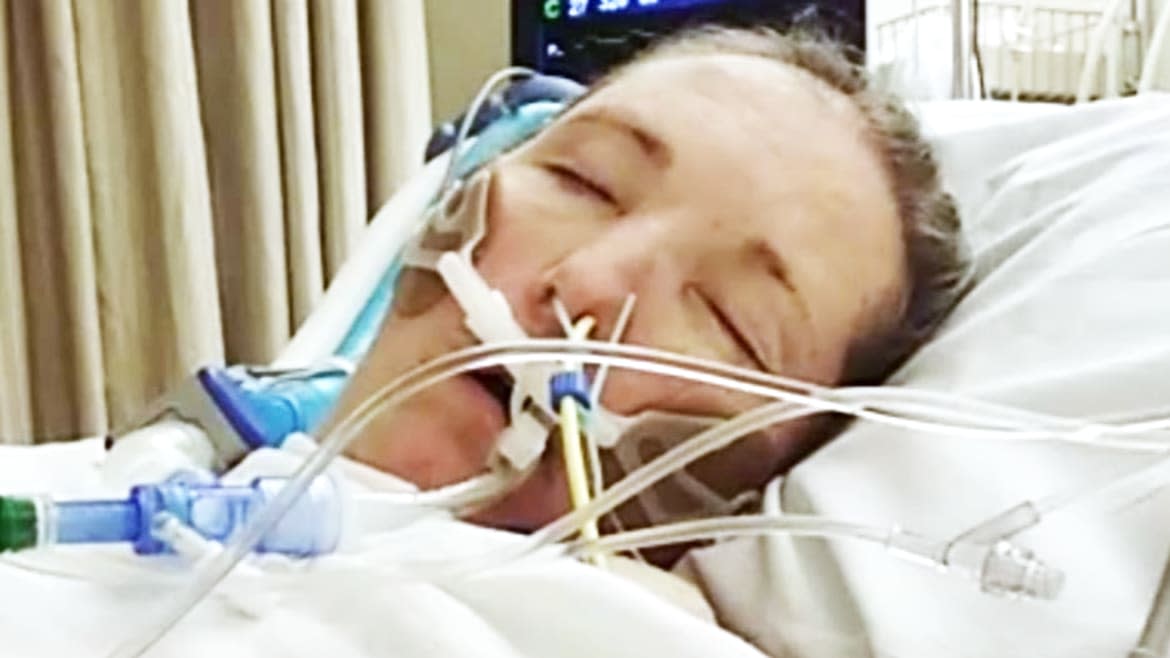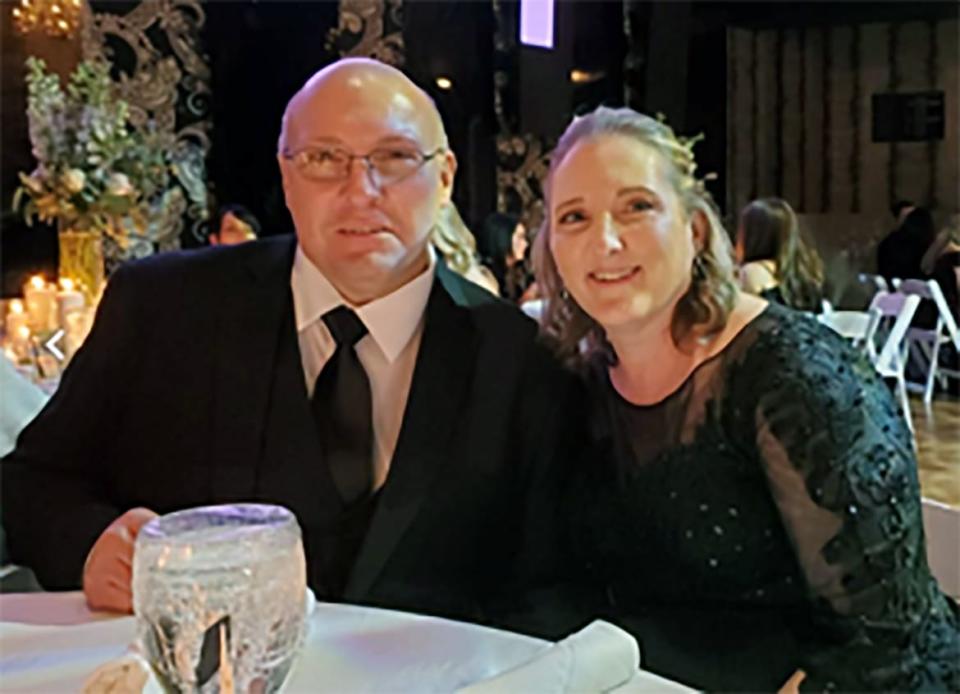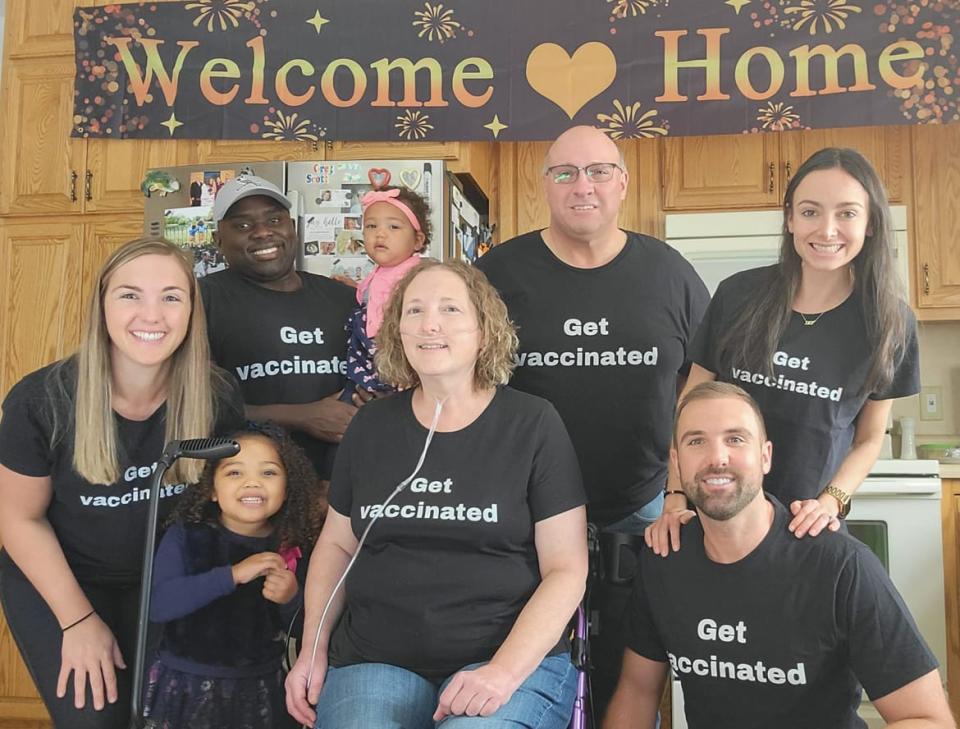Unvaxxed Lunch Lady Wants You to See Her COVID Death Spiral

- Oops!Something went wrong.Please try again later.
Michelle Fluegge wants everybody to see the photo of her on a ventilator during her very worst days because it shows what can happen if you fail to get vaccinated.
“If I can help even one person,” she told The Daily Beast of the picture, which shows her unconscious on a ventilator, her face pallid, the endotracheal tube down her windpipe held in place by a head strap, two other tubes inserted in her nose
Her family always knew her as the strong and unfaltering one who never got sick. School kids in New Ulm, Minnesota, knew her as one of the stalwart icons of childhood, the lunch lady who serves the midday meal with bright eyes and a smile.
But this 56-year-old in a town of 10,000 did not heed her two grown children when they urged her and their father, Greg Fluegge, to get vaccinated. Her son, Scott, who is 36, had moved to Fort Lauderdale, Florida, and her daughter, Linda Manyara, who is 33, was living in St. Louis. Both were in places where they could better grasp the actual magnitude of the pandemic and the importance of the vaccine.
“We had the Delta variant down here six months prior,” Scott later said of Florida. “The lines to the emergency room were insane.”
In New Ulm, the only person Michelle knew who had caught the virus was her husband’s father and he had experienced symptoms. She says the danger seemed remote even though COVID-19 cases in surrounding Brown County began to markedly rise, from 8 in June to 25 in July to 234 in August, then leaping to 555 in September.
Michelle and Greg are Democrats and their feelings regarding the vaccine were not shaped by politics and anti-vax conspiracy theories. They simply were hesitant to fully trust what did not seem imminently necessary.
“I don’t read a lot of stuff,” Michelle later said. “I wasn’t sure what the shot was going to do to me a year from now.”
She and her husband and 40 percent of New Ulm chose not to get vaccinated.
“We didn’t know enough about it,” Michelle later said of the vaccine. “We were scared. A lot of people in our small town just weren’t getting vaccinated and my kids were wanting us to, but they live out of state. And, I don’t know, we just weren’t secure yet. But I really wish we would’ve. I wouldn’t have had ended up how I was.”
Among the seemingly more immediate threats to life was Alzheimer’s disease, which claimed Greg’s mother, Shirley Fluegge—a former hospital dietician and collector of Elvis memorabilia—on Sept. 25.
The funeral was on Sept. 30, but Greg had a 104-degree fever that morning. Michelle took him to the ER and he tested positive for COVID-19.
“They said we both cannot go to the funeral,” Michelle remembered.
Michelle tested positive the next day.
“We were not vaccinated,” Michelle said. “We did wrong.”

The indomitable lunch lady became so weak she could barely get out of bed.
“It just was a chore for me to get up and move around,” she recalled. “I was very sick, but I never would tell people. I was always a tough one. They all thought my husband was the one that was gonna end up being so sick.”
The couple used a fingertip pulse oximeter to monitor their blood oxygen saturation, and both seemed to be holding their own.
“I thought I was getting better,” Michelle recalled.
Then, on the sixth day, her blood oxygen level plummeted from 93 to a perilous 66 in a matter of minutes.
“My numbers just turned on me,” Michelle recalled. “COVID can do different things and I am a diabetic.”
Greg found her in the bathroom and took her to the hospital. She managed to walk into the ER.
“I was weak, but I’m strong,” she said. “I remember going into the ER and into a bed. They gave me oxygen. They told me I had pneumonia in my lungs. And after that, I don't remember anything.”
Michelle needed a ventilator, but the hospital had none. The doctors spent three hours trying to find a facility that had one available.
“They thought she was going to die,” Scott said.
Michelle seemed to be minutes from the end when the doctors reported they had finally found a ventilator at Abbott Northwestern Hospital in Minneapolis.
“They had a very difficult time finding one, and then one magically opened up,” Scott said.
A helicopter was on the way to make the flight from New Ulm, but there remained a potentially fatal hitch. A man on the gurney beside Michelle had come in ahead of her and was also critically ill with COVID.
“There was an older gentleman that was supposed to take the helicopter up to Minneapolis for that ventilator,” Scott recalled. “And my mom was younger. He said, ‘If anybody’s going to survive, it’s going to be her… Don’t take me, take her.’”
The helicopter took off with Michelle aboard. She was put on that lone available ventilator and placed in a prone position to facilitate breathing. But after five days, her prospects remained grim as calculated by her “P/F ratio,” a measure of lung function in intubated patients. Hers was under 100, which is classified as “severe.”
“They basically told us she wasn't gonna make it,” Scott said. “Her lungs were severely damaged. So we essentially said our goodbyes.”
Michelle could not have visitors due to COVID, so the family had to bid her farewell via an iPad set next to her ear.
“A lot of ‘I love you’s,’” Scott recalled.
But she held on.
“We started to talk to her every day, multiple times,” Scott said.
For three days, they told Michelle to keep fighting so she could be around for her grandchildren and future grandchildren.
“And she started to turn around,” Scott recalled. “It took a while.”
Then the family received what Scott terms “the best call we’ve ever gotten.”
“The doctor said, ‘She’s going to make it, we’re going to take the ventilator out,’” Scott remembered.
Michelle has no recollection of her 18 days on the ventilator other than some hazy moments that were either just before or just after it was removed.
“Right at the end, I remember waking up. I was pretty foggy and everything, but they made me sit up and then they made me cough,” she said.
“The nurse would swab in my mouth. It was a minty tasty thing. I think I still had the ventilator on me. I'm not quite sure if I did or not, but they made me gag up this brown mucus stuff in a bag. And I watched it come out. I was so weak, but they said I had to do this. I don’t remember how many times I did it, but it felt like a lot.”
At one point, she was almost ready to quit.
“I told myself in my mind, ‘I can’t do this anymore,’” she recalled. “I couldn’t breathe. I thought I was gone, going to be dying.”
She kept on.
“And one time I must have been gagging and they weren’t ready and, oh my God, they came running to me,” she said. “I remember that part.”
She also recalls that the nurses would hold her hand.
“And they made me sit up a lot,” she remembered. “I had to be getting better at that time.”
Kristi Noem Still Doesn’t Understand How COVID and Vaccines Work
On Oct. 30, the night before her birthday, she was moved to a room where she was allowed a single visitor. Her husband, who had come through COVID without being hospitalized, brought her glasses and her phone.
“After he left that night, I looked at my phone and I didn’t know how to use it,” she said. “I had a big fog for at least five or six days.”
The doctor would come in and ask her questions to test her mental status.
“He’d repeat them every day,” she said. “I got the year wrong the first time. But the next time, I remembered.”
Swallowing had been extremely painful immediately after the ventilator was removed, but it became less so. A speech therapist had to help her regain her voice.
And walking was a challenge.
“I took probably three days just to be able to walk with the walker to where the door was in my room,” she recalled. “They said, ‘You’re doing good. That’s good.’”
She gave her all through two daily physical therapy sessions.
“They said, ‘You’re a fighter,’” she recalled. ‘I said, ‘Yeah.’”
She was asked if she was depressed.
“That’s just not me,” she later said. “They could tell that after they asked me a few times.”
The lunch lady who had never taken a sick day until COVID struck had been unable to work and her children sought to ease the financial pressure with a GoFundMe page. They posted the photo taken of her when she was on a ventilator.
“Mom wanted us to share this picture of her to show what it looks like to be on a ventilator,” they noted on the page. “None of us knew what it was like beforehand and she wants the message to be heard that getting vaccinated is important not only to you as an individual, but to the loved ones around you.”
They reported that Michelle was continuing to suffer the consequences of not getting the jab.
“There are many unknowns and the doctors at Abbott said she is going to be a COVID long-hauler, but the main thing is she survived which we thank God for!” they wrote. “A COVID long-hauler is someone that experiences long-term damage to the lungs, heart, and brain which increases the risk of long-term health problems.”
Ten days after she was moved from the ICU to a COVID unit on a medical floor, Michelle was transferred to a short-term rehabilitation facility in a nearby town. Minnesota Gov. Tim Walz had activated the National Guard to assist a health care system overburdened by a virus that leaves a quarter or more patients with persisting symptoms.

On Nov. 20th, Michelle was discharged. She was home in time to have Thanksgiving dinner with Glen, along with Scott and his wife, as well as Linda and her husband and their two children. The family put up a big WELCOME HOME sign, and her son and daughter gave everybody black t-shirts stenciled with two words in white letters.
“GET VACCINATED.”
But as thankful as she was just to be alive, she was still suffering the effects of the virus. A self-described “go getter” who had never been one to just sit now continued to need oxygen whenever she was not at rest.
“For me these days to be sitting so much—oh my gosh,” she told The Daily Beast. “If I’m standing more than like 10, 15 minutes, my oxygen levels kind of go down because of my lungs being so damaged.”
Another result of long-haul COVID came every time she washes her hair.
“I'm losing a lot of hair, like handfuls of hair,” she reported.
A niece who had a much milder encounter with COVID was also losing her hair.
“She never ended up in the hospital, but she is having those same symptoms now, too,” Michelle reported. “She went to a dermatologist and they said it is COVID-related…I just hope it doesn’t last too long. I told my niece at Christmas, ‘We’re gonna have to invent some wigs, some good wigs. We can make some money.’”
The current big problem for Michelle is breathing, and some days are better than others. Last Friday was a good one.
“I was in the kitchen for at least almost an half-hour,” she reported. “I didn’t use my oxygen and I felt so good and I checked my meter and I had a 96. But tomorrow, who knows? I can have a bad day and then I have to rest more. It’s just how it is. I’m learning how to cope with it. But I’m blessed to be alive.”
She was reminded of her good fortune when she learned that a co-worker had died of COVID. She heard that the man who may have saved her life by insisting she be the one to fly off on the helicopter had survived. She hoped to learn his name and thank him.
In December, she was fully vaccinated, experiencing some side effects after the first jab, none after the second. She continued to suffer the far more serious effects of not having done so earlier. And there was no telling how long the long haul might be.
Two days after Christmas, she received a letter from the local school district where she had worked as a lunch lady for 26 years. She was informed that as of Jan. 25 she will have used up her allotted sick days.
“After that, it said, your employment with the district will end,” she said
Scott says she was heartbroken and in tears, but she told The Daily Beast that she still counts herself lucky.
A photo of Michelle and Greg taken at their son’s wedding in November of 2020 shows her at her radiant and indomitable best, but the one she wants everybody to see is from her worst days.
“I was dying,” she said. “Please get vaccinated so you won’t have to be suffering like this.”
Get the Daily Beast's biggest scoops and scandals delivered right to your inbox. Sign up now.
Stay informed and gain unlimited access to the Daily Beast's unmatched reporting. Subscribe now.

